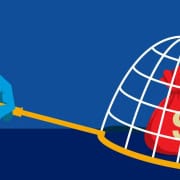|
Getting your Trinity Audio player ready...
|
Image: Michael Kuhlmann for UNCTAD
Over one trillion dollars. That’s the amount of money that Africa is estimated to have lost in illicit financial flows (IFFs) over the past 50 years (Kar and Cartwright-Smith, 2010; Africa Growth Initiative, 2020). The current estimate is an annual amount of around $50-billion, and possibly more – a significant increase from Kar and Cartwright-Smith’s average of about $22-billion.
Predictably, oil and precious metals and minerals are the two sectors most affected.
Often connected to tax havens, IFFs are cross-border transfers of money which are illegal according to law, rules or custom, and their purpose is to avoid having to report such transfers. These losses are hugely detrimental to the continent’s development plans and programmes as well as standards of governance, as they enable money laundering, shrink government tax revenues, deepen corruption, aggravate foreign debt problems, impede private sector development, reduce the state’s capacity to provide public resources and services, and weaken institutions, according to the UN Economic Commission for Africa (ECA).
The implications are so great that in 2012 the AU and the ECA established a high-level panel to investigate IFFs from Africa. It was chaired by former South African president Thabo Mbeki, and comprised nine other members from Africa and abroad. It found, among others, that corruption and abuse of entrusted power plays a big role, that transparency is key across all aspects of IFFs, and that commercial routes of IFFs need closer monitoring.
The problem might seem insurmountable, but the Tax Justice Network’s (TJN) Illicit Financial Flows Vulnerability Tracker, launched in June 2020, provides another weapon in the anti-IFF arsenal. It measures and visualises the vulnerability of countries across the world to various forms of IFF over time.
“A key challenge to addressing these illegal transfers has been the difficulty for countries to identify which channels and trading partners pose the greatest risks,” says TJN.
The vulnerability tracker overcomes this challenge by reporting the level of vulnerability to illicit financial flows each country faces in relation to eight main channels: trade (exports and imports), banking positions (claims and liabilities), foreign direct investment (outward and inward) and portfolio investment (outward and inward), making it possible to identify and home in on particular areas of concern. It is worth noting the distinction between foreign direct investment and portfolio investment, in which latter case an investor merely purchases equities of overseas-based companies.
For each channel within each country, the tracker calculates three measures:
- Vulnerability captures how financially secretive the country’s trade, investment or banking partners are – this represents the average financial secrecy level of all partners with which the country trades or invests in for a given channel, weighted by the volume of trade or investment each partner is responsible for.
- Intensity reports the share of a GDP that the particular channel is responsible for, thus helping to capture its importance to the country. For example, inward foreign direct investment may represent 10% of a country’s GDP, resulting in an intensity score of 10%.
- Exposure combines a channel’s vulnerability and intensity to estimate the share of a country’s GDP exposed to illicit financial flows by the channel.
Secrecy is the key here. The more secretive a country’s trading partners are, the more vulnerable that country is to the reality of IFFs siphoning its precious resources. Furthermore, each country’s profile page shows the 10 trade, banking or investment partner countries that provide the most likely opportunities for illicit flows. By helping to better understand this particular vulnerability, the tracker is intended to assist policy makers, journalists, academics and civil society in curbing and preventing IFFs.
Various datasets are used to compile the tracker. Data on banking positions is collected from the Bank for International Settlements , foreign direct investment from the Coordinated Direct Investment Survey series of the International Monetary Fund, portfolio investment from the Coordinated Portfolio Investment Survey series of the International Monetary Fundand trade data from UN COMTRADE database.
South Africa’s vulnerability to IFFs
Some countries are more vulnerable than others, depending on their individual situations relating to the various factors mentioned above. How vulnerable, then, is the country at the southern-most tip of the continent?
For South Africa, the TJN tracker presents comprehensive data only up to 2018, but there is some limited data available for 2020. However, the problem is still as relevant and worrisome today as it was a few years ago.
TJN has supplied an average figure of $3 391 890 587 that is lost in tax every year to global tax abuse. This is greater than the global average loss of 2.6% of tax revenue, but less than the regional average tax revenue loss of 7%. Of that alarming sum, $3-billion is lost to global tax abuse committed by multinational corporations, while $683-million is lost to global tax evasion committed by private individuals.
The social impact of this tax loss, notes TJN, is equivalent to 22.38% of South Africa’s health budget, or 15.76% of spending on education.
Overall, TJN has identified South Africa’s greatest area of vulnerability as outward foreign direct investment (FDI). This is a business strategy in which a firm or individual establishes foreign business operations or acquires foreign business assets in a foreign company, thereby investing in the foreign economy. This result implies that South Africans operate companies in places with high levels of financial secrecy, leading to a high risk for IFFs (and offshore tax evasion) to occur via direct investment.
South Africa’s trading partners that are chiefly responsible for its vulnerability are China, Mauritius, and Hong Kong, which replaced the UK in 2013 after the latter’s four-year run. In 2014 Luxembourg was one of the top three, with China and Mauritius, but since 2015 the top three have remained the same apart from a spot of position-swapping.
The country’s vulnerability score for the outward FDI channel is 60/100, where 100 is the worst. This is a high score, and as noted above, the reason is financial secrecy. Because these partner countries – as do many others around the world – deliberately withhold financial information from relevant authorities, such as tax authorities and police services, there is a lower risk of illegally obtained money being tracked. Dirty money, therefore, can be stashed safely.
What is being done?
South Africa has no single piece of legislation aimed at fighting IFFs. The country relies on “a number of laws that involve cooperation and collaboration between a number of institutions, each bearing varying degrees of responsibility”, according to the Helen Suzman Foundation. “These include the Financial Intelligence Centre Act, various tax laws, the Companies Act, and general criminal laws such as those against fraud.”
Meanwhile, Yunus Carrim – chairperson of the parliamentary Select Committee on Finance – has said that the legal framework is more than adequate, but as residents have seen time and time again in relation to many ambitious government schemes, “We have some of the most sophisticated legislation globally. The challenge is implementation.”
He said the institutions involved, including the South African Revenue Service, the Financial Intelligence Centre, the Hawks, and the National Prosecuting Authority, have to cooperate more closely, because South Africa is not making much headway in clamping down on IFFs.
Three years after Cassim’s plea, South Africa is still dithering.
In February 2021, Parliament’s Standing Committee on Finance reiterated, in a budgetary review meeting, its proposal that President Cyril Ramaphosa considers establishing an inter-ministerial committee to combat IFFs, as tackling these requires the collaboration of various agencies in different ministries such as finance, the police, justice, trade and industry, and minerals and energy.
Until a proper, firm, inter-country commitment is made to dedicate resources to combat IFFs, it may not be possible to achieve the high-level panel’s hope that “the radical reduction of illicit capital outflows from Africa, short of ending them, is precisely the outcome Africa and the rest of the world must achieve to produce a strategically critical new balance … between the volumes of domestic and foreign capital required for meaningful and sustained African development.”







